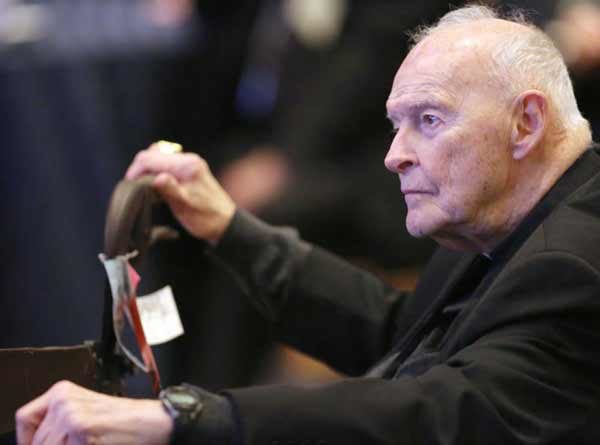DEDHAM, Mass. — A Dec. 21 motion for transcript, audio, and video recordings of depositions related to the criminal charges against ex-Cardinal Theodore McCarrick was an important step for the prosecution, according to one of his alleged victims present in the courtroom.

The motion was a part of a brief second pre-trial hearing in the case at Dedham District Court in Massachusetts. In addition to the motion, the case was continued to March 3 for a status update.
[Related: How McCarrick Was Charged 50 Years After Alleged Crime]
McCarrick wasn’t present in the courtroom. His attorney Barry Coburn stated he had no objection to the commonwealth’s motion before exiting the courtroom without further comment.
James Grein, a Virginia man who came forward in 2018 with two decades of abuse allegations against McCarrick, was present in the courtroom on Dec. 21 and told The Tablet that he had “high emotions” ahead of the hearing. Grein said it was “important” for him to be there “to see the motion go through and understand the victory” for the district attorney, adding that it was crucial to moving the case forward.
The alleged victim in the criminal case against McCarrick remains unnamed. He is represented by Mitchell Garabedian — an attorney long known for representing those who have made allegations against Catholic clergy — who was not present in the courtroom on Dec. 21. The Tablet couldn’t reach him for comment after the hearing.
McCarrick was criminally charged in July with three counts of indecent assault and battery on a person over 14 stemming from the alleged sexual assault of a 16-year-old boy during a wedding reception at Wellesley College on June 8, 1974.
McCarrick’s presence at the Sept. 3 arraignment was his first public appearance since 2018. He is the first former or current U.S. cardinal to be charged criminally with sexual abuse.
McCarrick’s presence was waived for the second pretrial hearing on Dec. 21, or the first on Oct. 28. He was released at his arraignment on the conditions he pay $5,000 cash bail, have no contact with the alleged victim or anyone under 18, not leave the United States, and surrender his passport. He was also warned that if he is charged with a crime in the time until his pretrial hearing he could be incarcerated.
Grein is hopeful that significant progress will be made in the case between Dec. 21 and March 3.
“The prosecution gets to listen and see if there’s anything that the defense is going to do and if the defense is going to want to try to make any motions whatsoever they have three months to get it done,” Grein said. “So the next time we meet all of those other things that are out on the sidebars are all done and the next one is right in front of the judge.”
Grein added that a conviction against McCarrick is important because it “opens the door” for other clerics to be criminally charged that have committed sexual abuse.
Even though the charges against McCarrick are from nearly 50 years ago, a specific aspect of the statute of limitations on criminal charges in Massachusetts allowed McCarrick’s accuser to pursue charges for the alleged sexual assault. The statute of limitations for criminal cases in Massachusetts is set up to “toll,” or pause, when the offender is out of the state. McCarrick has never resided in Massachusetts, therefore, the statute of limitations for this case doesn’t apply.
McCarrick was laicized — reduced to lay status — by the Vatican in 2019 after allegations of sexual abuse against adults were substantiated. To date, there have been a number of civil lawsuits filed against McCarrick, mostly in New Jersey and New York. However, none of them were filed criminally.
